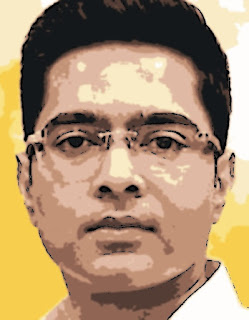Abhishek Banerjee is a prominent Indian politician and a member of the Trinamool Congress (TMC) party. He is the Member of Parliament (MP) from Diamond Harbour constituency in West Bengal. In this post, we will take a closer look at Abhishek Banerjee's early life, education, political career, personal life, controversies, and conclusion.
Abhishek Banerjee's Early Life and Education:
Abhishek Banerjee was born on November 7, 1987, in Kolkata, West Bengal. He comes from a politically active family, as his father, Amit Banerjee, was a TMC leader and his aunt, Mamata Banerjee, is the current Chief Minister of West Bengal. Abhishek completed his schooling from St. James' School in Kolkata and later earned a Bachelor's degree in English literature from the Bhawanipur Education Society College.
Abhishek Banerjee's Political Career:
Abhishek Banerjee's political career began in 2011 when he joined the Trinamool Congress party. He quickly rose through the ranks and was appointed as the National President of the All India Trinamool Youth Congress in 2014. In 2016, he was elected as a Member of Parliament from Diamond Harbour constituency in West Bengal, a seat previously held by his uncle, Alok Banerjee.
As a Member of Parliament, Abhishek Banerjee has been actively involved in the development of his constituency and the state of West Bengal. He has been instrumental in the implementation of several welfare schemes for the poor and marginalized communities. He has also been a vocal advocate for the rights of farmers and laborers.
Abhishek Banerjee's Personal Life:
Abhishek Banerjee is married to Rujira Narula, who is of Thai-Indian origin. The couple has a son named Avijit. Abhishek is known for his simple and humble lifestyle, and he is widely respected for his personal integrity and honesty.
Controversies:
Abhishek Banerjee has been involved in several controversies throughout his political career. One of the most notable controversies was the Narada sting operation, in which several TMC leaders, including Abhishek Banerjee, were caught on camera accepting bribes. However, Abhishek denied the allegations and claimed that the video footage was doctored.
In addition to the Narada sting operation, Abhishek Banerjee has also been accused of being involved in illegal coal mining in West Bengal. The Central Bureau of Investigation (CBI) conducted raids at his residence and office in connection with the case. However, Abhishek has denied any wrongdoing and has claimed that the allegations are politically motivated.
Conclusion:
Abhishek Banerjee is a young and dynamic leader who has made a significant contribution to the politics of West Bengal. He has emerged as a key figure in the Trinamool Congress party and has been instrumental in the party's success in the state. Despite facing several controversies and challenges, he has always maintained his integrity and commitment to public service. Abhishek Banerjee is widely regarded as a clean politician and an able administrator, and his future prospects in politics are bright. His legacy will continue to inspire future generations of leaders in West Bengal and beyond.

No comments:
Post a Comment